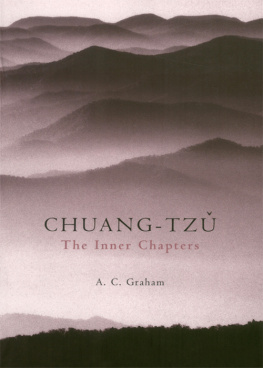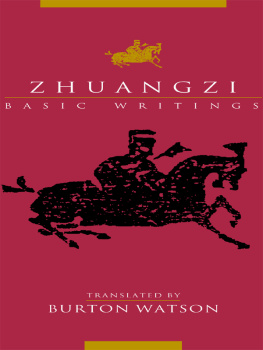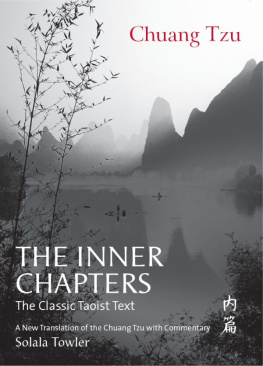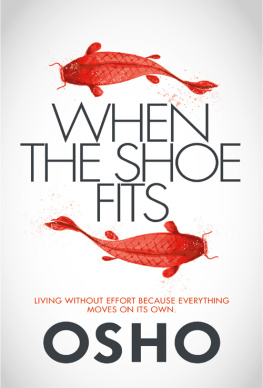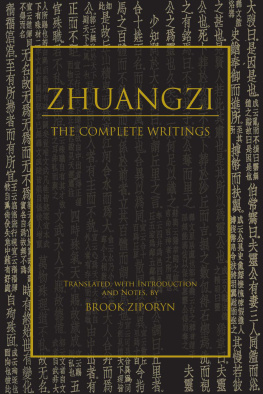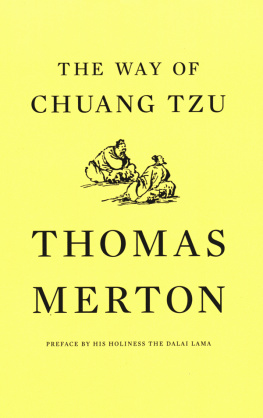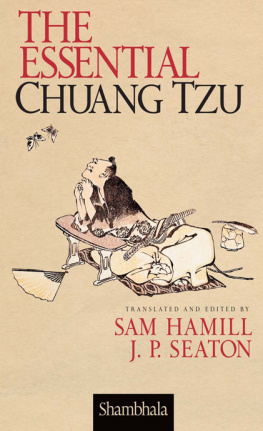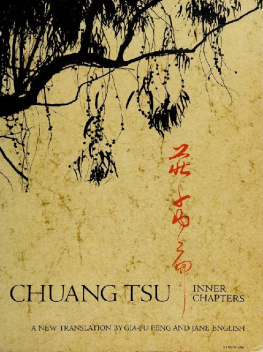CHUANG-TZ
The Inner Chapters
CHUANG-TZ
The Inner Chapters
Translated by
A. C. Graham
Hackett Publishing Company, Inc.
Indianapolis/Cambridge
To Dawn
Copyright 1981, 1986, 1989 by A. C. Graham
Preface to the 2001 edition copyright 2001 by Hackett
Publishing Company, Inc.
Reprinted 2001 by Hackett Publishing Company, Inc.
All rights reserved
Printed in the United States of America
06 05 04 2 3 4 5 6 7
For further information, please address:
Hackett Publishing Company, Inc.
P.O. Box 44937
Indianapolis, IN 46244-0937
www.hackettpublishing.com
Cover design by Abigail Coyle
Photo: www.comstock.com
Library of Congress Cataloging-in-Publication Data
Zhuangzi.
[Nanhua jing. English. Selections]
Chuang-tzu : the inner chapters / translated by A. C. Graham.
p. cm.
Originally published: London ; Boston : Allen & Unwin, 1981.
Includes bibliographical references and index.
ISBN 0-87220-582-7 ISBN 0-87220-581-9 (paper)
I. Graham, A. C. (Angus Charles) II. Title.
BL1900.C5 E5 2001
ePub ISBN: 978-1-62466-224-9
Confucius, Analects. Translated by Edward Slingerland.
Philip J. Ivanhoe and Bryan W. Van Norden, eds., Readings in Classical Chinese Philosophy (Second Edition).
Laozi, The Daodejing of Laozi. Translated, with Commentary, by Philop J. Ivanhoe.
Mengzi, Mengzi. Translated, with Introduction, by Bryan W. Van Norden.
Zhuangzi, The Essential Writings. Translated, with Introduction, by Brook Ziporyn
Foreword to the Hackett Edition
It is a most pleasurable task to pen a few words celebrating the republication of Angus Grahams Chuang-Tz: The Inner Chapters. First published in England by George Allen & Unwin (now a branch of HarperCollins) in 1981, Grahams translation went out of print some years ago, but not before it became the benchmark by which all other readings of the ancient work must be measured.
Sinological specialists encountered some difficulties in utilizing Grahams highly original working of the Zhuangzi (Chuang Tz), as that ancient text has been arranged and transmitted for two millennia in China: he rearranged the text and did not translate the whole of it; he employed the older Wade-Giles system of transliterating Chinese terms rather than the pinyin system now standard in both China and the U.S.; and his copious textual notes to the translation were published separately by the London School of Oriental and African Studies, Grahams institution.
One major consideration weighed heavily against altering Grahams original edition, and hence this first reprinting duplicates it, save for the correction of a few minor misprints, the inclusion of a transcription conversion table for the Wade-Giles and pinyin systems, and the present Foreword. That decisive consideration was to preserve the integrity of Grahams scholarly and philosophical originality, re-presenting the work just as he first presented it (about which he never expressed any misgivings to the present writer over the course of many discussions of the work before his untimely death in 1991). Moreover, this decision allowed Hackett Publishing Company to reprint the book expeditiously, and to make it available to a wide audience, which would, I am confident, have greatly pleased Graham.
To console the specialist, and to bring under one compass all of Grahams writings on Zhuangzi, a supplement to the present volume is being published by the Society for Asian & Comparative Philosophy Monograph Series, the University of Hawaii Press. Entitled A Companion to A. C. Grahams Chuang Tz: The Inner Chapters, it is being edited, with an Introduction, by Harold C. Roth.
There is much in both Angus Graham and Zhuangzi that is philosophically profound, of religious significance, and poetically playful and creative; consequently the reader has a great deal to look forward to in the pages that follow. For those heretofore unfamiliar with Graham, a complete bibliography of his writings (and a brief biography) may be found in Chinese Texts and Philosophical Contexts: Essays Dedicated to Angus Graham, edited by the undersigned and published by Open Court Publishing Company in 1991. Readers wishing to study Zhuangzi in greater depth should consult two recent collections of essays, both of which make signal use of Grahams scholarship on the text: Essays on Skepticism, Relativism, and Ethics in the Zhuangzi, edited by Paul Kjellberg and Philip J. Ivanhoe, and Wandering at Ease in the Zhuangzi, edited by Roger T. Ames. Both are published by the State University of New York Press, in 1996 and 1998 respectively.
In planning and preparing this work for reissue, I received helpful advice and assistance from many scholars, especially Roger Ames, Jane Geaney, P. J. Ivanhoe, Jack Kline, and Hal Roth. For the realization of the volume I am grateful to Deborah Wilkes and Jay Hullett of Hackett Publishing Company. And this gratitude is expressed as well on behalf of Grahams widow, Der Pao (Judy) Graham, and his daughter, Dawn Graham Baker.
It is now time to turn to the book itself. May Zhuangzi give a lift of the heart (page 33) to the reader, as he has done to countless thousands over the past two millenniaincluding, it will shortly be obvious, Angus Graham.
Henry Rosemont, Jr.
St. Marys City, MD
November 2000
| Pinyin | Wade-Giles |
| b | p |
| c | ts, tz |
| ch | ch |
| d | t |
| g | k |
| ian | ien |
| j | ch |
| k | k |
| ong | ung |
| p | p |
| q | ch |
| r | j |
| si | szu |
| t | t |
| x | hs |
| yu | u |
| you | yu |
| yu | y |
| z | ts, tz |
| zh | ch |
| -i (zhi) | -ih (chih) |
| zi | tzu |
The textual notes to this translation have been published separately as Chuang-tz: Textual notes to a partial translation, School of Oriental and African Studies, 1981. My conclusions on the date and composition of the book are presented in How much ofChuang-tz did Chuang-tz write?, in Studies in Classical Chinese thought, edited Henry Rosemont Jr and Benjamin I. Schwartz, Journal of the American Academy of Religion Thematic Issue, Sept 1979, 47/3, 459502.
I would like to thank Douglas Hewitt and Henry Rosemont Jr for reading and commenting on the translation of the Inner chapters and John Hardy for introducing me to Oscar Wildes review of Giles version.
Extracts or earlier drafts from this translation have appeared in History of Religions v. 9 and in Montemora Nos 1, 3, 4.
Chuang-tz and the origins of Taoism
We know very little about the life of Chuang Chou (commonly called Chuang-tz), who wrote the nucleus of what Arthur Waley described as one of the most entertaining as well as one of the profoundest books in the world. The book is the longest of the classics of Taoism, the philosophy which expresses the side of Chinese civilisation which is spontaneous, intuitive, private, unconventional, the rival of Confucianism, which represents the moralistic, the official, the respectable. The

